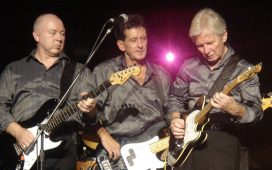The Brits are no stranger to protest or political statement: the 1996 ceremony contained both, with Jarvis Cocker driven to moon Michael Jackson over his sanctimonious environmental-awareness hit Earth Song. In 2014, David Bowie pleaded with a pre-referendum Scotland to remain part of the UK. Katy Perry made giant skeleton effigies of Donald Trump and Theresa May dance on stage in 2017; a year later, a drunk Damon Albarn railed against Brexit.
But there is something about a new wave of emboldened black British artists taking centre stage and delivering an unambiguously political message that feels far more historic and impactful: not pleas for unity or cartoonish satire, nor traditional rock-star rebellion, but explicit condemnations of Britain’s ongoing history of racism, delivered into the heart of primetime TV.
When Dave performed a new, extended version of his song Black at this week’s Brits, he declared Boris Johnson “a real racist”, demanded justice for the Windrush generation and reparations for Britain’s history of slavery and colonialism, and indicted the media’s treatment of Meghan Markle. He lambasted the government’s failure to properly rehouse victims of the Grenfell tragedy – echoing Stormzy’s condemnation of Theresa May over the issue at last year’s ceremony. To the surprise of everyone who thought Lewis Capaldi would make a clean sweep of his four nominations, Dave pipped the Scot to the night’s top prize, best British album, for his complex debut Psychodrama. He used his speech to tell kids growing up in south London that they’re no different from him, legitimising their experiences and dreams.
We are a long way from the #BritsSoWhite backlash of 2016, a hashtag coined in response to an entirely white cohort of British nominees – just as grime was reaching its commercial peak. The controversy forced the hand of the Brits: a year later, it diversified its voting body and appointed a specialist committee comprising leading BAME figures from music and media to advise on its new voting members and possible live performances. (This year’s voting committee comprised 24.4% BAME voters and 49% women.)
While institutional change happened slowly, black artists – often asked to provide entertainment at events that failed to garland their work – got creative with how they used these spaces to make statements. At the 2015 Brits – where not a single black British artist won an award – Kanye West invited grime legends including Skepta, Stormzy and Krept & Konan decked in black hoodies to mosh with flamethrowers as he performed All Day. The performance racked up more than 150 complaints to Ofcom for West’s use of the N-word – and viewing figures rose by 1.2m after reaching a historic low the previous year.
In 2017, Skepta performed Shutdown on the show, and included the on-record sample of a middle-class female voice complaining about West’s performance two years earlier: “A bunch of young men all dressed in black dancing extremely aggressively on stage – it made me feel so intimidated, and it’s just not what I expect to see on primetime TV.” The next year’s awards saw Kendrick Lamar dressed in a black diamante-studded hoodie rapping atop a transparent box, inside which rapper Rich the Kid smashed up a Lamborghini: a head-tilting performance art piece that confused viewers and critics alike.
The performances from this week’s Brits continued the previous trends of black artists using their moments in the limelight to clap back at their exclusion. Most notable was Tyler, the Creator accepting his award for international male solo artist, when he took a swipe at Theresa May for his five-year ban for supposedly promoting terror and hatred in his lyrics – while white artists with similar lyrical focus, such as Eminem, were not banned. Softer than his Grenfell rap in 2018, but no less political in its way, was Stormzy’s performance at this year’s Brits: an emphatic assertion of the depth and breath of global black creativity. It drew in British grime, American gospel and African pop (with Nigerian guest star Burna Boy), climaxing in a euphoric performance of Rainfall surrounded by tens of people of colour that seemed to say: we’re here to stay.
Now that black British artists are finally getting credit for their creativity, success and vast cultural influence, and being given the space to represent the breadth of their vision, they’re refusing to let white fans and industry gatekeepers enjoy and consume black art without having to reckon with the struggle and history of oppression that underpin it. Black artists don’t have the privilege of being apolitical.
These moments are special and affirming for black Brits – but it’s also necessary to question the Brits and ITV’s intentions. As people switch off from awards ceremonies and viewing figures dwindle, is ITV relying on the white outrage caused by such explicit displays of black defiance to remain relevant? In their genuine desire to represent and speak out, are artists compromised as marketing ploys? Are white execs patting themselves on the back for showcasing black artistry, then leaving them to navigate the onslaught of abuse from social media, politicians such as Priti Patel and the press? How ITV and the Brits react to the aftermath of these performances is just as important as providing the platform in the first place.
Once upon a time, a black artist protesting Britain’s racist leadership on national TV might have been blacklisted. But the unimpeachable cultural power commanded by today’s leading acts has allowed many of them to remain independent, rather than reliant on major labels with the power to sideline them if they step out of line. Information is now freely shared between a generation of fed-up young people with social media at their fingertips, who know how to wield their voices and consumer power in the face of injustice.
It represents a significant shift in power – not to mention musical iconography. The accepted forms of rebellion and public displays of angst at the industry’s awards ceremonies have typically been reserved for stereotypical white rock stars: getting drunk, stoking beef, acting out. Not only are black artists winning prizes and dominating the news with their powerful cultural statements, they’re redefining what it looks like to be a rock star, giving rebellion true purpose.














